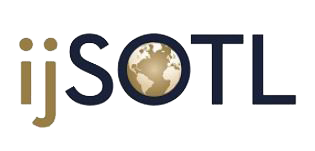Georgia Southern Outstanding SoTL Scholars
Georgia Southern Outstanding SoTL Scholars retired as an award in Spring 2024. The replacement award is Georgia Southern Emerging SoTL Scholars.
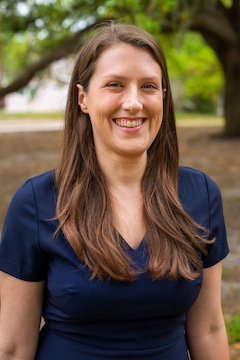
2023 – Dr. Laura Bayliss (Department of Communication Arts, CAH)
Dr. Lauren Bayliss (Ph.D., Mass Communication, University of Florida) is an associate professor of public relations in the Department of Communication Arts at Georgia Southern University. She teaches courses in public relations, research methods, and communication strategy. In her research, she uses qualitative and quantitative methods to explore strategies for communicating complex information both for strategic health communication and for the scholarship of teaching and learning. Her current research explores food communication and how nutrition messages influence different audiences.
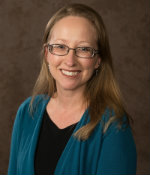
2022 – Dr. Virginia Wickline (Psychology, CBSS)
As an associate professor of Psychology, I joined the Georgia Southern faculty in 2018. To me, real learning is doing, not memorizing – and I teach students, not facts. I am a huge advocate in my scholarship, teaching, and service for both Kolb’s Experiential Learning model and Bloom’s Taxonomy. My SoTL research has primarily focused on student engagement, success, and development, especially utilizing various forms of experiential learning. I have researched whether study abroad, global courses, and other “glocal” options like service-learning and virtual or face-to-face cross-cultural dialogues between domestic and international students are effective for increasing students’ intercultural competence. I have investigated whether practice or graded quizzing results in higher psychology test scores. Most recently, I have been determining how a skills-based syllabus section and course approach, as well as other syllabus features, impact students’ perceptions of the instructor’s master teacher behaviors and the course’s benefits for their future job and graduate school aspirations. At the institutional level, I am a current Service-Learning Faculty Fellow, a former Faculty Center SoTL Scholar, an adviser to two student organizations, an undergraduate teaching assistant mentor, and a research mentor for undergraduate independent studies, including the McNair Scholars program and the Honors College. As part of the Wexford Faculty Development program, I am excited to be taking students to our new Global Learning Center in Ireland beginning Summer 2023. Finally, as a member of the High-Impact Practice (HIP) committees for both the institution as a whole (Provost’s Office) and for the College of Behavioral and Social Sciences (CBSS), I am working to promote the expansion of HIP options across the university, supporting both faculty and students to engage in these meaningful and potentially life-changing educational experiences.
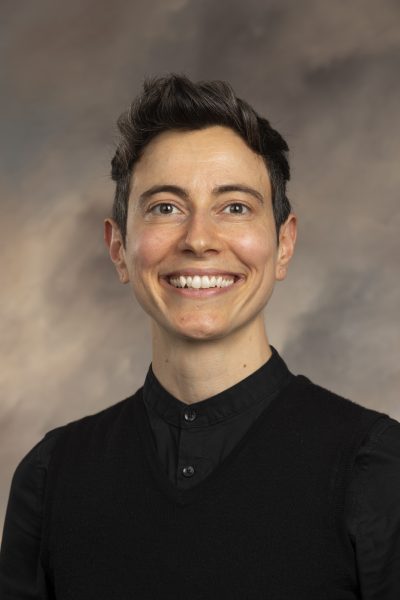
2021 – Dr. Nikki DiGregorio (School of Human Ecology, CBSS)
Dr. Nikki DiGregorio joined Georgia Southern University in August of 2014 and is an associate professor in the School of Human Ecology. Dr. DiGregorio currently serves as the president of the Family Science Association, the discipline’s premier teaching-focused organization and has published SoTL research examining pedagogy centered around diversity, value systems, underrepresented gender and sexual minorities, social policies, and instructional technologies. More specifically, Dr. DiGregorio believes that SoTL provides a platform for educators to examine and evaluate their own teaching and its relationship to student learning; as such, Dr. DiGregorio’s SoTL work has explored student engagement with value-laden course material and the effectiveness of specific teaching strategies. Recognizing the intersection of students’ lived experiences and learning is a critical component of developing and supporting educational contexts that are more inclusive and, in alignment with Georgia Southern’s institutional pillar of inclusive excellence, Dr. DiGregorio strives to foster student learning by way of SoTL. Dr. DiGregorio serves as a Co-Editor-in-Chief of the International Journal for Scholarship of Teaching and Learning and is dedicated to the broad dissemination of SoTL research to help improve teaching and learning for educators, learners, and communities they serve.
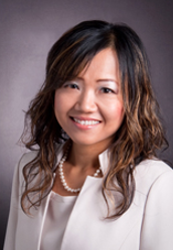
2020 – Dr. Jackie Kim (Leadership, Technology, & Human Development, COE)
Dr. Kim has long been active in the Scholarship of Teaching and Learning. Her research interests are centered on bridging a gap between theory and practice. After years of her SoTL-related research endeavor, she generously shares her expertise with faculty new to SoTL by serving as one of twelve mentors on the Georgia Southern SoTL Leadership Team. Dr. Kim has conducted numerous SoTL studies and shares her expertise far beyond Southern through extensive peer-reviewed publications and conference presentations.
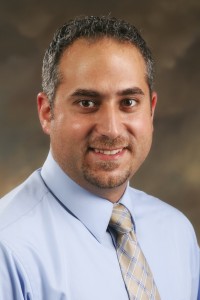
2019 – Dr. Rami Haddad (Electrical & Computer Engineering, CEC)
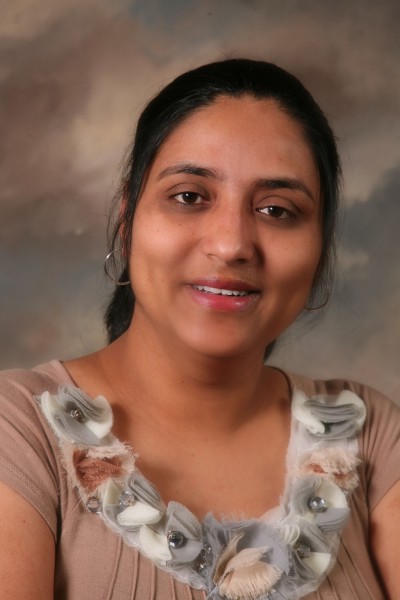
2018 – Dr. Shainaz Landge (Chemistry & Biochemistry, COSM)
Dr. Shainaz Landge joined Georgia Southern University in August of 2010. She completed her M.S. degree in Organic Chemistry (2000) from the University of Pune (India) and worked as a project assistant at the National Chemical Laboratory in Pune. In 2008, she completed her Ph.D. research at the University of Massachusetts, Boston, and then moved on to a postdoctoral position at Dartmouth College (NH). Dr. Landge has completed several SoTL research projects investigating student motivation and retention of learning gains.
Watch: SoTL Stories: Nomenclature Topic (11:38)
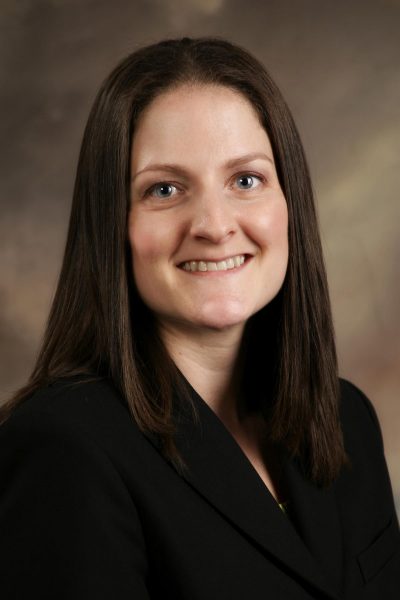
2017 – Dr. Jody Langdon (School of Health and Kinesiology, CHP)
Jody Langdon, Ph.D., is an associate professor in the School of Health and Kinesiology. Dr. Langdon began her SoTL research at Georgia Southern as a SoTL Fellow in 2013 investigating the effects of the Flipped Classroom Model on perceptions of course experience, motivation, course performance, and basic need satisfaction. Since her experience as a fellow, she has continued researching in the SoTL field, leading to one publication and four conference presentations. Her most recent research focuses on metacognition and its ability to enhance student learning. Additional research is now being conducted on autonomy supportive teaching among undergraduate instructors. Dr. Langdon also serves on the Georgia Southern SoTL leadership team and has been a mentor to numerous emerging SoTL scholars.
Watch: SoTL Stories: Flipped Learning
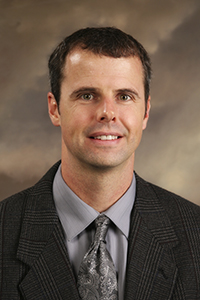
2016 – Dr. John Dobson (School of Health and Kinesiology, CHP)
John Dobson, Ph.D., is an assistant professor of Exercise Science in the School of Health and Kinesiology. Most of his SoTL research has focused on the application of learning strategies that were developed by cognitive scientists. Dobson has investigated the learning benefits of such strategies as Interleaving, Spacing and Generation; but he has been particularly interested in Retrieval Practice, which can be described as the act of recalling information after exposure. His research has demonstrated that retrieval-based strategies can enhance both recall and the ability to synthesize complex information from a variety of kinesiology content areas, including information from anatomy & physiology, structural kinesiology and exercise physiology courses.
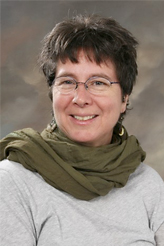
2014 – Dr. Adrienne Cohen (Department of Sociology and Anthropology, CLASS)
Adrienne Cohen, Ph.D., is an assistant professor of sociology in the Department of Sociology and Anthropology. Cohen received the award for her three SoTL research projects from which she has produced three publishable works. She collaborated on her research with students and colleagues. In addition, Cohen was a 2012-’13 SoTL Scholar. A native of Hull, Massachusetts, she’s been a faculty member for three years. Cohen received $2,000 acknowledging her efforts.

2013 – Dr. Misty Loughry (Department of Management, COBA)
Misty L. Loughry is a Professor of Management at Georgia Southern University. She studies peer control, peer ratings, teamwork, and team-member effectiveness. She directed the research that laid the theoretical foundation for the CATME peer evaluation instrument and has directed the dissemination of research results. Her research has been published in journals such as Organization Science, Small Group Research , and Educational and Psychological Measurement.
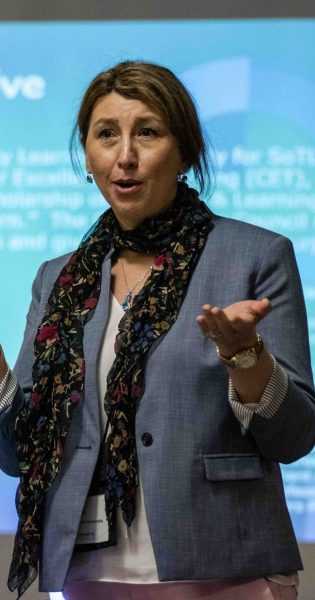
2012 – Dr. Diana Sturges Botnaru (Department of Health & Kinesiology, CHP)
Shulman (2000) argues that there are three rationales for SoTL: professionalism, pragmatism and policy. It is our professional obligation to be scholars in our discipline, it provides significant learning and it can provide evidence for policy decisions. While engagement in SoTL happens for different reasons and at different times for many faculty, my engagement with SoTL happened gradually and emerged out of my own experience in the classroom. It is now an indispensable component of my academic career, which is shaping my activity as a college professor. I have been involved in multiple SoTL activities and my SoTL research is focusing on two major areas. The first area encompasses projects that I do in my own discipline of Human Anatomy and Physiology. The second area is focusing on interdisciplinary research in SoTL as part of the Faculty Learning Community on SoTL. I engage in SoTL because I care about my students; I want to investigate problems related to teaching and learning; I want to apply best practices in my classroom; I feel the need to share with colleagues and ultimately, SoTL is providing me with a deep sense of satisfaction that I am part of a continuous exploration of teaching and learning and that important evidence is making its way into classrooms.

2012 – Dr. Janie Wilson (Department of Psychology, CLASS)
My SoTL research centers on professional relationships between college teachers and students. Specifically, I’ve worked with colleagues to examine rapport based on contacting students before classes begin, activities during the first day of class, and immediacy behaviors as predictors of valuable student outcomes (e.g., grades). Additional SoTL work has involved an examination of ethical boundaries when creating relationships with students, social psychological concepts at work in the classroom, and the importance of passion in teaching to engage students.
In the past few years, my SoTL research has focused on creating a rapport scale with Drs. Rebecca Ryan and Jim Pugh, both in the Psychology Department at Georgia Southern University. The research team also assessed reliability and validity of the rapport scale and recently published these data. One follow-up project involves reducing the 34-item scale to fewer items to encourage use by other teachers.
Within the past two months, I began a new branch of SoTL research with Denise Beyer, a Psychology Master’s student, and Heather Monteiro, a student in the Logistics Doctoral Program at Georgia Southern University. The new avenue of research examines potential predictors of rapport in the classroom as well as student perceptions of the teacher and course. The main predictor of interest is the age (or perceived age) of the professor. Based on the small number of publications in this area, age bias may be an issue in teaching evaluations.

2011 – Dr. Trent Maurer (School of Human Ecology, CHHS)
I subscribe to Kathleen McKinney’s 3-part model of Scholarly Teaching: 1) Good Teaching is that which enables students to learn. 2) Scholarly Teaching is that which uses evidence about the teaching-learning connection and best practices in pedagogy to further enhance student learning. 3) The Scholarship of Teaching & Learning [SoTL] is actually producing and disseminating new evidence in peer-reviewed fora for other teachers to use in their own Scholarly Teaching.
I take the challenge to engage in SoTL research very seriously, as I believe good teachers have a responsibility not only to evaluate the effectiveness of their own teaching, but to share what works with the entire academic community for the improvement of teaching worldwide. Thus, I engage in SoTL for three primary reasons. SoTL makes me a better teacher. SoTL makes my students better learners. SoTL allows me to pay forward to the academic community information of value to improve the teaching-learning process in other classrooms and other institutions.”

2011 – Laura Regassa (Department of Biology, COSM)
My goal as a new faculty member was to teach in a meaningful way while maintaining a high-quality research program. While I still have the same goal, the path to success has changed dramatically due to the Scholarship of Teaching and Learning. SoTL research has positively impacted all areas of my profession – teaching, research and service; and coalesced these seemingly disparate responsibilities around central, overlapping themes/programs.
2010 – Inaugural SoTL Awards
Dr. Laura Frost (Chemistry)
Dr. Lorraine Gilpin (Teaching & Learning)
Last updated: 4/4/2024

